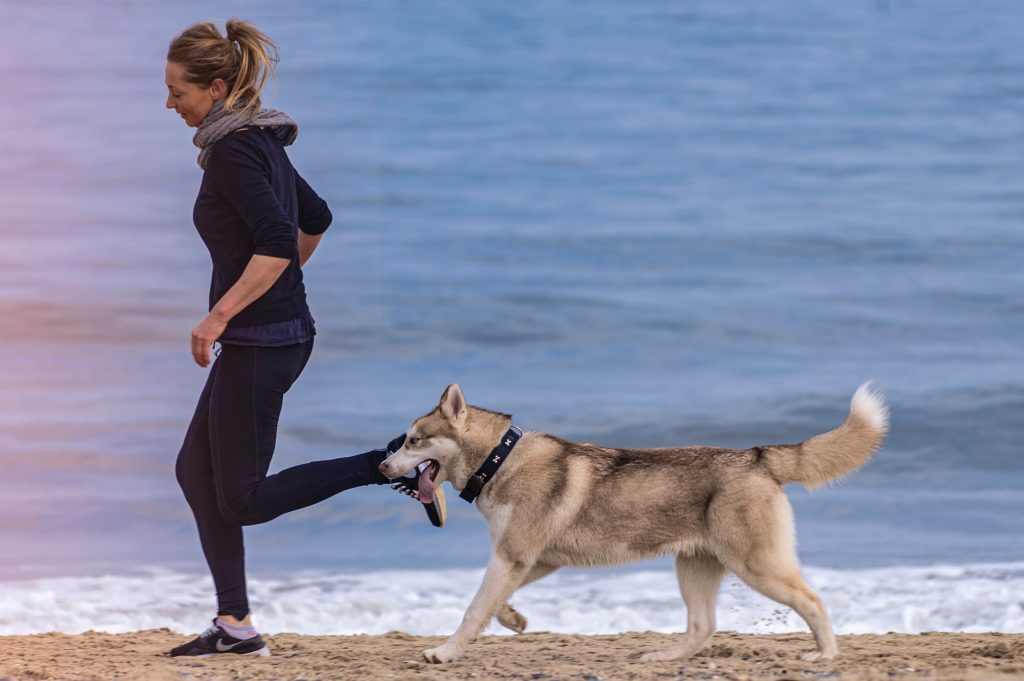The post aims to educate dog owners about the common signs of stress in dogs. By providing insights into these signs, the aim is to help dog owners recognize when their pets may be experiencing stress and understand the potential triggers. The objective is to empower dog parents to take proactive measures to reduce stress and provide a safe and supportive environment that promotes their dogs’ emotional well-being and overall health.

As devoted dog parents, it’s crucial to understand that our furry companions can experience stress, just like we do. Dogs communicate their emotions through subtle cues that may go unnoticed if we’re not attuned to their needs. In this blog post, we will explore five common signs that indicate your dog may be stressed. By recognizing these signs and understanding the potential triggers, we can create a supportive and calming environment to promote our dogs’ emotional well-being and overall health.
1. Body Language:
Our dogs use body language to communicate their feelings. We will examine cues such as tucked tail, flattened ears, lip licking, yawning, and avoiding eye contact, which may indicate that your dog is feeling anxious or stressed.
2. Changes in Behavior:
Stress can lead to behavioral changes in dogs. We will discuss how excessive barking, whining, pacing, or sudden aggression may be a response to stressors in their environment.
3. Loss of Appetite:
A decrease in appetite can be a significant indicator of stress in dogs. We will explore how stress may lead to changes in eating habits and what you can do to support your dog during such times.
4. Excessive Grooming or Scratching:
Stressed dogs may engage in excessive grooming or scratching as a self-soothing mechanism. We will help you understand the difference between normal grooming and stress-related behavior.
5. Withdrawal and Isolation:
When dogs are stressed, they may withdraw and seek isolation. We will discuss how to identify signs of isolation in your dog and ways to help them feel more secure and comfortable.
Conclusion:
Our dogs depend on us to recognize and address their stress and anxiety. By understanding the common signs of stress, we can provide them with the care and support they need for emotional well-being. Remember, every dog is unique, and what causes stress in one may not affect another. Paying attention to your dog’s body language and behavior is essential in identifying their stressors.
If you notice any signs of stress in your dog or have questions about managing their stress, we are here to help. Chat with us on our website, and our team of experts can provide personalized guidance, tips, and coping strategies for your specific situation. Let’s work together to ensure a happy and stress-free life for your furry friend.
Remember, your dog’s well-being is our priority. Don’t hesitate to reach out to us through our website chat for expert help in decoding and addressing your dog’s stress.

Frequently Asked Questions:
How can I tell if my dog is stressed?
Dogs communicate stress through various cues. Look for signs such as tucked tail, flattened ears, lip licking, yawning, avoiding eye contact, excessive barking, pacing, changes in appetite, excessive grooming, or withdrawal from social interactions.
What are some common triggers of stress in dogs?
Common triggers of stress in dogs include changes in routine, loud noises (thunderstorms, fireworks), new environments, unfamiliar people or animals, separation from their owners, and traumatic experiences.
My dog has suddenly become aggressive. Could this be due to stress?
Yes, sudden aggression can be a response to stress. When dogs feel threatened or anxious, they may exhibit aggressive behavior as a way to cope or protect themselves. If your dog’s behavior has changed, it’s essential to consult with a veterinarian or a professional dog behaviorist to understand the underlying cause.
How can I help my stressed dog feel more secure?
Creating a safe and calming environment is crucial for helping a stressed dog. Provide a quiet and comfortable space where they can retreat, maintain a consistent routine, offer positive reinforcement and rewards, and engage in calming activities like gentle massages or playtime.
Should I seek professional help if my dog is stressed?
If your dog’s stress is severe, persistent, or interfering with their quality of life, seeking professional help is recommended. A veterinarian or a certified dog behaviorist can provide tailored solutions and behavior modification techniques to address your dog’s stress.



